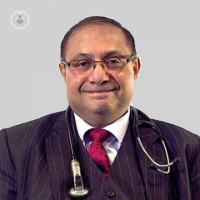How do ‘senior moments’ differ from the signs of dementia?
Written by:Although many people may be concerned by so-called ‘senior moments’ or short-term lapses in memory, infrequent forgetfulness is, in fact not an indicator of dementia. In this informative guide, highly respected consultant physician Dr Mashkur Khan shares his expertise on the signs of dementia and how they differ from occasional memory problems. The revered specialist also explains the importance of seeking medical advice early about dementia concerns and details the multi-step approach top diagnosis of the condition.

What is the difference between age-related memory changes and dementia?
People often ask about the difference between changes to our memory as we age and dementia but in fact, the distinction is hard to miss. As we all know, brief lapses of memory, also known as ‘senior moments’, can occur more frequently as we age.
In the United States, this is known as benign essential forgetfulness which describes when you go into a room to do something but you forget why it is you have gone there, for example. A lot of people experience these moments from time to time and think they have dementia but this is not the case. People suffering from dementia suffer from lapses in memory far more frequently and may have to hunt for their glasses, car keys or wallet, for example, on a daily basis.
Another of the early features of dementia is loss of navigation. This can manifest in many ways, for example, going to pick up the newspaper and not being able to find the way back or taking a wrong turn while driving and being unable to find the correct way home.
These features help us differentiate between age-related changes to our memory and the signs of dementia. Additionally, the input of family and friends is very important and often, people may notice that their loved one becomes quieter and seems to be listening more and talking less. Unfortunately, their world starts to shrink and they may lose motivation and speech. When a person prefers simply to nod rather than speak, this is a cause for concern.
Is dementia a normal sign of ageing?
Dementia is certainly not just a normal part of ageing. Many people enjoy very good memory at an older age. Even at ninety years of age, some people continue to be perfectly capable of working, or can still beat younger friends in quizzes and puzzle challenges.
Dementia is a disease much like heart or lung disease. It is characterised by wear and tear on the brain which is unfortunately accentuated by an inability to look after yourself and to go about your usual daily activities like shopping, cooking or cleaning.
When should you seek advice from a specialist?
It’s important to get specialist advice early. The best analogy I could make is related to running out of petrol on a motorway. If you noticed lights on the dashboard indicating you were very low on petrol whilst driving on the motorway, you would stop at the next petrol station to fill up, rather than waiting for your car to completely run out of fuel and stop. The same logic applies to dementia care – you should ask for help as soon as possible.
There is a lot of merit in diagnosing dementia early as you have access to the right prevention and treatment. This gives people with dementia the confidence to lead a full life and enjoy their holidays and activities and to spend time with their family and friends.
How is dementia diagnosed?
Even today, the best diagnosis of dementia is clinical and usually, a person’s family are quite aware of the symptoms their loved one has been experiencing. To support this, we also perform MRI scans which look at the brain’s hippocampus. This acts a little like the computer of the brain but is actually a very small area.
In patients with dementia, these scans show us hippocampal atrophy, a decrease in size or wasting away of this part of the brain. More importantly, however, a very subtle but key feature that can be seen is asymmetry of the brain resulting from wear and tear of the temporal, frontal and posterior lobes.
Additional to MRI scans, we also perform a battery of blood tests which may tell us about related vitamin, iron or calcium deficiencies. Memory tests are also a key element of dementia diagnosis, including the Montreal Cognitive Assessment (MoCA) and Addenbrooke’s Cognitive Examinations.
If you are concerned about a loved one’s memory and wish to book a consultation with Dr Khan, you can do by visiting his Top Doctors profile.


